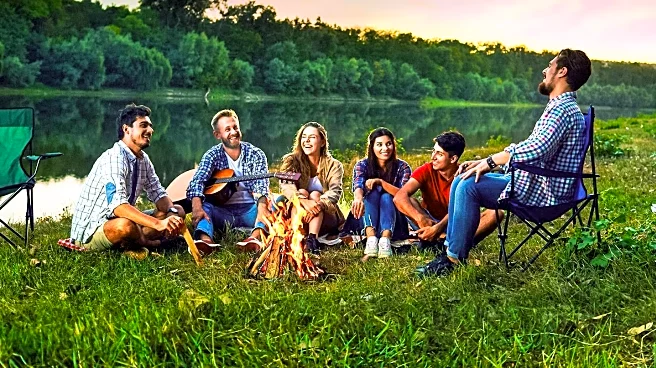What's Happening?
Adult sleepaway camps are gaining popularity as a means for individuals to reconnect and experience a sense of nostalgia. These camps, such as Camp Social, provide a luxury experience that allows adults
to relive childhood camp memories while engaging in activities designed to foster connection and relaxation. According to USA TODAY Mental Health reporting fellow Rachel Hale, these camps offer a unique blend of luxury and nostalgia, attracting those who seek a break from their daily routines. The Excerpt podcast highlights the growing trend of these camps, which, despite their high costs, are becoming a sought-after option for adults looking to escape and reconnect.
Why It's Important?
The rise of adult sleepaway camps reflects a broader societal trend towards seeking meaningful connections and experiences. In an era where digital interactions often replace face-to-face communication, these camps offer a rare opportunity for adults to unplug and engage in genuine social interactions. The high cost associated with these camps indicates a willingness among participants to invest in experiences that promise emotional and mental well-being. This trend could influence the hospitality and wellness industries, prompting them to create more tailored experiences that cater to the growing demand for mindfulness and connection.
What's Next?
As the popularity of adult sleepaway camps continues to rise, it is likely that more such camps will emerge, offering a variety of themes and experiences. The hospitality industry may see an increase in demand for similar retreats that focus on wellness and connection. Additionally, businesses may explore partnerships with these camps to offer corporate retreats aimed at team building and employee well-being. The trend could also inspire innovations in how traditional camps are structured, potentially leading to more inclusive and diverse offerings.
Beyond the Headlines
The trend of adult sleepaway camps highlights a cultural shift towards valuing experiences over material possessions. This shift may have long-term implications for consumer behavior, as people increasingly prioritize spending on activities that enhance their quality of life. Furthermore, the emphasis on connection and mindfulness at these camps could contribute to a broader societal movement towards mental health awareness and self-care.










